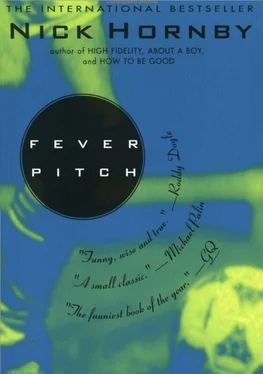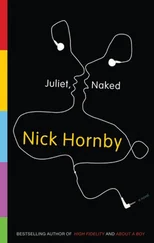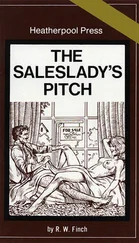We overrate the seventies, most of us in our thirties. We look back on it as a golden age, and buy the old shirts, and watch old videos, and talk with awe and regret of Keegan and Toshack, Bell and Summerbee, Hector and Todd. We forget that the England team didn’t even qualify for two World Cups, and we overlook the fact that most First Division teams contained at least one player—Storey at Arsenal, Smith at Liverpool, Harris at Chelsea—who simply wasn’t very good at football at all. Commentators and journalists complain about the behaviour of today’s professionals—Gazza’s petulance, Fashanu’s elbows, Arsenal’s brawling—but they chuckle indulgently when they remember Lee and Hunter scrapping all the way back to the dressing rooms after they had been sent off, or Bremner and Keegan being banished for fighting in a Charity Shield game. Players in the seventies weren’t as fast or as fit, and probably most of them weren’t even as skilful; but every single side had someone who could pass the ball.
Liam Brady was one of the best two or three passers of the last twenty years, and this in itself was why he was revered by every single Arsenal fan, but for me there was more to it than that. I worshipped him because he was great, and I worshipped him because, in the parlance, if you cut him he would bleed Arsenal (like Charlie George he was a product of the youth team); but there was a third thing, too. He was intelligent . This intelligence manifested itself primarily in his passing, which was incisive and imaginative and constantly surprising. But it showed off the pitch too: he was articulate, and drily funny, and engaged (“Come on David, put it away” he cried from the commentary box when his friend and old Arsenal colleague David O’Leary was about to take the decisive penalty for Ireland in the 1990 World Cup-tie against Romania); as I progressed through the academic strata, and more and more people seemed to make a distinction between football on the one hand and the life of the mind on the other, Brady seemed to provide a bridge between the two.
Of course, intelligence in a footballer is no bad thing, particularly in a midfield player, a playmaker, although this intelligence is not the same intelligence as that required to enjoy, say, a “difficult” European novel. Paul Gascoigne has the footballing intelligence by the bucketload (and it is a dazzling intelligence, involving, among other skills, astonishing co-ordination and a lightning-fast exploitation of a situation that will change within a couple of seconds), yet his lack of even the most basic common sense is obvious and legendary. All the best footballers have some kind of wit about them: Lineker’s anticipation, Shilton’s positioning, Beckenbauer’s understanding, are products of their brain rather than functions of simple athleticism. Yet it is the classical midfielder whose cerebral attributes receive the most attention, particularly from the sports writers on the quality papers and from the middle-class football fans.
This is not only because the sort of intelligence that Brady and his ilk possess is the most visible, in footballing terms, but because it is analogous to the sort of intelligence that is prized in middle-class culture. Look at the adjectives used to describe playmakers: elegant, aware, subtle, sophisticated, cunning, visionary … these are words that could equally well describe a poet, or a film-maker, or a painter. It is as if the truly gifted footballer is too good for his milieu, and must be placed on a different, higher plane.
Certainly there was an element of this attitude in my deification of Brady. Charlie George, the previous idol of the Arsenal North Bank, had never been mine in the way Liam was. Brady was different (although of course he wasn’t, really—his background was pretty much the same as that of most footballers) because he was languid and mysterious, and though I possessed neither of these qualities, I felt that my education had equipped me to recognise them in others. “A poet of the left foot,” my sister used to remark drily whenever I mentioned his name, which was often, but there was a truth behind her irony: for a time I wanted footballers to be as unlike themselves as possible and, though this was stupid, other people do it still. Pat Nevin, particularly in his Chelsea days, became a much better player when it was discovered that he knew about art and books and politics.
The Nottingham Forest game, a sleepy nil-nil draw on a sleepy, grey, Bank Holiday Monday, was Brady’s last at Highbury; he had decided that his future lay abroad, in Italy, and he was gone for several years. I was there to see him off, and he did a slow, sad lap of honour with the rest of the team. Deep down I think I still hoped that he would change his mind, or that the club would eventually become aware of the irreparable damage it would do to itself if it allowed him to leave. Some said that money was at the heart of it, and that if Arsenal had stumped up more he would have stayed, but I preferred not to believe them. I preferred to believe that it was the promise of Italy itself, its culture and style, that had lured him away, and that the parochial pleasures of Hertfordshire or Essex or wherever he lived had inevitably begun to fill him with an existential ennui. What I knew most of all was that he didn’t want to leave us all, that he was torn, that he loved us as much as we loved him and that one day he would come back.
Just seven months after losing Liam to Juventus I lost my girlfriend to another man, slap-bang in the middle of the first dismal post-Brady season. And though I knew which loss hurt the most—Liam’s transfer induced regret and sadness, but not, thankfully, the insomnia and nausea and impossible, inconsolable bitterness of a twenty-three-year-old broken heart—I think that in some strange way she and Liam got muddled up in my mind. The two of them, Brady and the Lost Girl, haunted me for a long time, five or six years, maybe, so in a way it was predictable that one ghost should melt into the other. After Brady had gone Arsenal tried out a string of midfield players, some of them competent, some not, all of them doomed by the fact that they weren’t the person they were trying to replace: between 1980 and 1986 Talbot, Rix, Rollins, Price, Gatting, Peter Nicholas, Robson, Petrovic, Charlie Nicholas, Davis, Williams and even centre-forward Paul Mariner all played in central midfield.
And I had a string of relationships over the next four or five years, some serious, some not … the parallels were endless. Brady’s often-rumoured return (he played for four different clubs in his eight years in Italy, and before each transfer the English tabloids were full of unforgivably cruel stories about how Arsenal were on the verge of re-signing him) began to take on a shamanistic quality. I knew, of course, that the bouts of vicious, exhausting depression that afflicted me in the early-to-mid eighties were not caused either by Brady or the Lost Girl. They were to do with something else, something much more difficult to comprehend, and something that must have been in me for much longer than either of these two blameless people. But during these terrifying downs, I would think back to times when I had last felt happy, fulfilled, energetic, optimistic; and she and Brady were a part of those times. They weren’t entirely responsible for them, but they were very much there during them, and that was enough to turn these two love affairs into the twin supporting pillars of a different, enchanted age.
Some five or six years after he had gone, Brady did come home, to play for Arsenal in Pat Jennings’s testimonial game. It was a strange night. We were in even more need of him than ever (a graph of Arsenal’s fortunes in the eighties would resemble a U-bend), and before the game I felt nervous, but not in the way that I usually felt nervous before big games—these were the nerves of a former suitor about to embark on an unavoidably painful but long-anticipated reunion. I hoped, I suppose, that an ecstatic and tearful reception would trigger something off in Brady, that he would realise that his absence made him, as well as us, less than whole somehow. But nothing of the kind happened. He played the game, waved at us and flew back to Italy the next morning, and the next time we saw him he was wearing a West Ham shirt and smashing the ball past our goalkeeper John Lukic from the edge of the area.
Читать дальше











